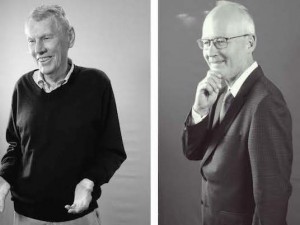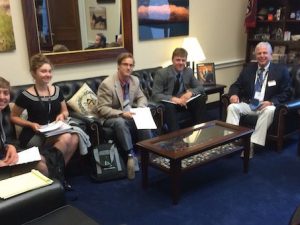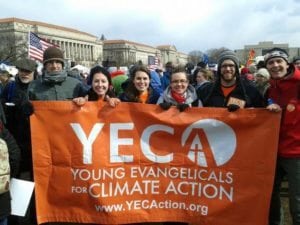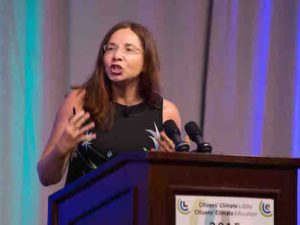
Dr. Natasha DeJarnett
How are the impacts of climate change similar to what we are experiencing with the coronavirus global pandemic? Many climate advocates have long felt sadness, anger, and despair over the destructive effects of climate change and the slow response by elected officials to do anything about it. Suddenly with the coronavirus outbreak we are all thrust into yet another existential crisis and even more grief. On this episode of Citizens’ Climate Radio, eight women talk about working through grief to a place of action. They use their expertise to connect the impacts of climate change to what we are now seeing with COVID-19.
Guests include:
- Dr. Natasha DeJarnett, Interim Associate Director Program & Partnership Development National Environmental Health Association
- Dr. Lise VanSusteren, an American psychiatrist in private practice in Washington, DC with a special interest in the psychological effects of climate change.
- Elizabeth Rush, author of “Rising: Dispatches from the New American Shore”
- Solemi Hernandez, Citizens Climate Lobby Southeast Regional Coordinator
- Edie Lush, co-host of Global GoalsCast podcast
- LaUra Schmidt and Aimee Lewis-Reau, co-founders of the Good Grief Network
- Anna Jane Joyner, co-host of No Place Like Home podcast
Host Peterson Toscano says, “As a podcaster, I get to hear and share stories. The stories and people I cover educate me about climate change and many other issues. They also affect me emotionally. They stir up sadness along with empathy.” Fellow climate podcasters Edie Lush and Anna Jane Joyner point out how essential grief was for them in helping understand what roles to take in the climate movement.
In addition to the mental health risks we face, Dr. DeJarnett highlights the groups most vulnerable to the impacts of COVID-19 and to climate change. These include people of color, children, and women. In a past episode, Dr. DeJarnett shared research conducted after Hurricane Katrina. It reveals women experienced extreme trauma in various forms, including domestic violence, during and after the storm. Dr. DeJarnett worries about similar dangers women now face during this time of extreme isolation. Solemi Hernandez speaks about her concerns for farm workers and the multiple risks they face as essential workers living in remote rural areas, often without health care and with unresolved immigration issues.
LaUra Schmidt and Aimee Lewis-Reau from the Good Grief Network share the tools they use to help climate advocates face the eco-grief that often slows us down. Through their 10-Step Program, Personal Resilience and Empowerment in a Chaotic Climate, they have seen climate advocates breakthrough so they are more energized to do their work.
All of the guests share best practices and strategies to help process grief and cope with stress in this time of coronavirus.
Art House
In the Art House, writer Elizabeth Rush returns with good news. Her book “Rising: Dispatches from the New American Shore” has garnered awards and was chosen as the Read Across Rhode Island pick. At the kick off event Elizabeth watched an excerpt of a play based her book. Observing herself portrayed on stage gave her a chance to realize something about her own grief process she had not noticed before. She talks about what she learned and reads selections from her book.
Puzzler Question
Listeners share what they would say in response to last month’s puzzler question, which addressed concerns about the yellow vest protests in France and if something similar might happen in the U.S. if legislation is passed to put a price on carbon.
For a new puzzler question, let’s imagine that on Earth Day, you had an online conversation with your friend, Gretchen. You share your renewed commitment to promote climate solutions, but Gretchen said, “You know, I am concerned about the planet too, but with so many people affected by COVID-19, I think we are just going to have to deal with that first. Climate action is very important, but for so many people right now, there are more pressing issues.”
Gretchen is correct. When people are struggling to pay bills, put food on the table, and as they recover from so many different losses, they often don’t have space for climate conversations. In fact, this has been true for lots of marginalized people for a long time, even before coronavirus. So this puzzler question is for you to answer for yourself. How do you navigate your climate work as we deal with the impacts of coronavirus?
Send Peterson your answers by May 17, 2020. Email your answers to radio @ citizensclimate.org or leave a voicemail at 518-595-9414 (+1 if calling from outside the U.S.). Leave your name, contact info, and where you are from.
Dig Deeper
- Four ways Coronavirus is Turning the Natural World Upside Down, The Atlantic
- Experts See a Worrisome Link Between Pollution and Coronavirus, The Hill
- Climate Change and Health Equity, American Public Health Association
- Coronavirus: Why Has the Virus Hit African-Americans So Hard? BBC
- Climate Change Increases the Risk of Violence Against Women, United Nations
- Climate Change Leads to More Violence Against Women, Girls, Deutsche Welle
- As Cities Around the World Go on Lockdown, Victims of Domestic Violence Look for a Way Out, Time Magazine
- How Millions of Women Became the Most Essential Workers in America, New York Times
- How the Pandemic Will End: Generation C, The Atlantic
- We Need Courage, Not Hope, to Face Climate Change, by Dr. Kate Marvel, On-Being
- Olio Food Sharing App
- Dutch Baby Recipe, New York Times
You can listen to Citizens’ Climate Radio on these platforms:
Also, feel free to connect with other listeners, suggest program ideas, and respond to programs in the Citizens’ Climate Radio Facebook group or on Twitter at @CitizensCRadio.
Citizens’ Climate Radio is a monthly podcast hosted by CCL volunteer Peterson Toscano.





